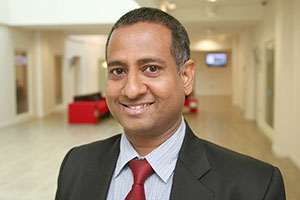A new role for Dr Ahmed Shaheed, of the University of Essex’s world-leading Human Rights Centre, will see him work with the United Nations (UN) to protect and promote religious freedom rights around the world.
Dr Shaheed, who already holds a UN mandate to monitor and advance human rights in Iran, has been announced as the new UN Special Rapporteur on Freedom of Religion or Belief.

Dr Ahmed Shaheed
Speaking about the challenges he faces, Dr Shaheed said: “I am keen to address emerging and existing concerns that fall within the scope of the mandate, and to focus on the implementation of international norms and standards, engaging with a wide variety of stakeholders in an open and inclusive manner.”
He praised previous mandate holders for “setting out the normative content of the right to freedom of religion or belief, and in identifying and exploring a number of key concerns and challenges.”
Dr Shaheed is the latest in a string of Essex academics and graduates who have held UN roles as independent experts and special rapporteurs.
Speaking about Essex’s heritage as a home for UN mandate holders, Dr Shaheed said: “Essex has been described by the current UN Special Rapporteur on the Right to Health as the ‘capital of UN special rapporteurs’ and that indeed is a very apt description.
“There is a strong focus on both theory and practice at Essex, and the history of supporting UN human rights mechanisms not only leaves behind strong traditions that can support a new mandate holder, but a natural and deeply embedded orientation towards practice.
“I came to Essex in the second year of my Iran mandate, and found Essex a very healthy and vibrant environment to develop a very challenging mandate, and I am confident that my new, and perhaps more challenging role, will also benefit from the vibrant and collegial environment at Essex.”
Dr Shaheed will step down from his current post as UN Special Rapporteur on the Human Rights Situation in Iran once a successor is appointed. Speaking about his achievements he said: “There is an increasing awareness of the human rights situation in Iran, both in Iran and internationally.
“I also believe the mandate contributed to increasing Iran’s cooperation with UN human rights mechanisms, including improving the rate of response to human rights related communications sent by the UN system.
“However, the most important impact has been to empower the people of Iran to voice their demands for their rights, and to contribute to a domestic discourse on human rights. There have been many instances when advocacy on behalf of specific individuals has resulted in the authorities responding positively to concerns raised.
However, the situation of human rights in Iran remains grim overall.
He added: “I had the opportunity to work with a number of dedicated Iranian human rights defenders and I will miss working with them.”
Dr Shaheed, a former Foreign Minister in The Maldives, was awarded a prestigious Leo Nevas Human Rights Award in 2015 for global leadership in advancing the purposes and principles of the UN.